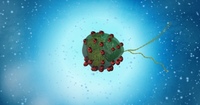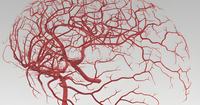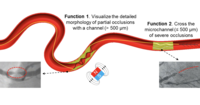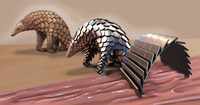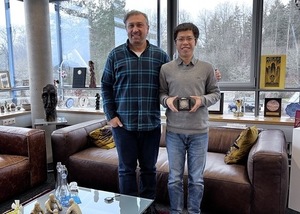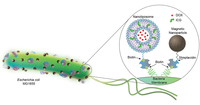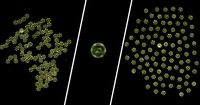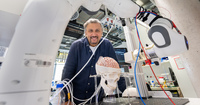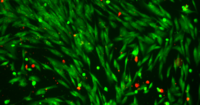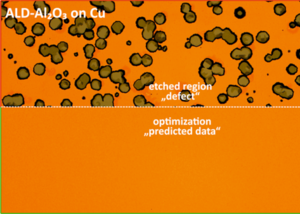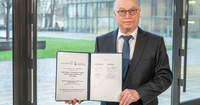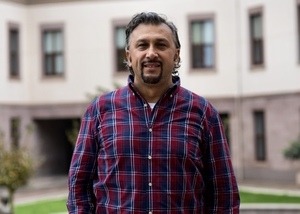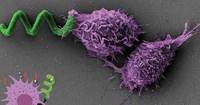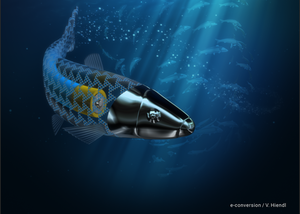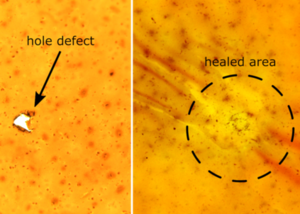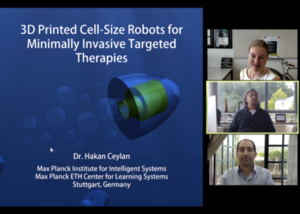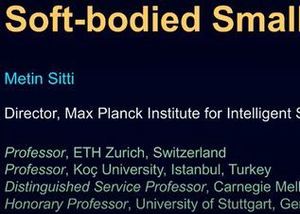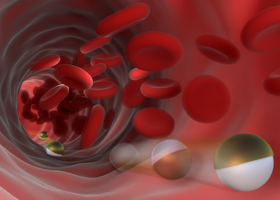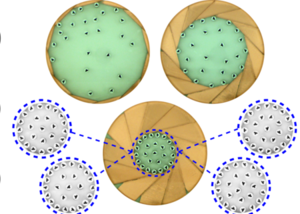News
Physical Intelligence
News
13-04-2025
Ren Hao Soon named 2025 Schmidt Science Fellow
Pioneering researcher in magnetic millirobotics to pivot into biomedical sciences with prestigious fellowship
Physical Intelligence
News
17-03-2025
Magnetic microalgae on a mission to become robots
Scientists at the Max Planck Institute for Intelligent Systems developed a single-cell green microalgae coated with magnetic material. This miniature robot was put to the test: would the microalgae with its magnetic coating be able to swim through narrow spaces and, additionally, in a viscous fluid that mimics those found in the human body? Would the tiny robot be able to fight its way through these difficult conditions? The team's research has now been published in the journal Matter.
Metin Sitti
Birgül Akolpoglu
Saadet Baltaci
Physical Intelligence
News
07-11-2024
3D robot navigation could enable multi-site medical procedures
Scientists at the Max Planck Institute for Intelligent Systems in Stuttgart, Germany, developed a novel method for deploying several magnetic miniature robots which can easily navigate through a 3D matrix resembling a network of blood vessels. This new method could one day enable the simultaneous treatment of multiple locations in hard-to-reach areas of the human body, which is currently unattainable with conventional tools. This innovative approach could significantly reduce procedure time and increase the effectiveness of minimally invasive therapies.
Chunxiang Wang
Tianlu Wang
Li Mingtong
Rongjing Zhang
Metin Sitti
Physical Intelligence
News
11-04-2024
Cyber Valley grants 500K to CELL’n’ROLL via 2023 Innovation Fellowship Program
Cyber Valley Community is advancing diagnostics for the future
CELL’n’ROLL aims to develop next-generation diagnostic solutions for detecting complex diseases such as cancer.
Alp Can Karacakol
Erdost Yildiz
Ugur Bozuyuk
Robotic Materials
Physical Intelligence
News
06-10-2023
Eine Qualle steht Modell
Test
Sie gelten nicht als Sympathieträger der Meere, doch in puncto Unter- wasserantrieb setzen sie Maßstäbe: Nicht zuletzt weil Quallen besonders effizient schwimmen, hat ein Team des Max-Planck-Instituts für Intelligente Systeme in Stuttgart einen Roboter nach dem Vorbild der Nesseltiere konstruiert. Jellyfish-Bots könnten in Zukunft helfen, besonders empfind- liche Ökosysteme wie Korallenriffe von Plastikmüll zu befreien.
Tianlu Wang
Hyeong-Joon Joo
Physical Intelligence
News
18-08-2023
Soft Robotic Tool provides new 'eyes' in endovascular surgery
The magnetic device can help visualise and navigate complex and narrow spaces
Scientists at the Max Planck Institute for Intelligent Systems in Stuttgart have developed a soft robotic tool that promises to one day transform minimally invasive endovascular surgery. The two-part magnetic tool can help to visualise in real time the fine morphological details of partial vascular blockages such as stenoses, even in the narrowest and most curved vessels. It can also find its way through severe blockages such as chronic total occlusions. This tool could one day take the perception of endovascular medical devices a step further.
Metin Sitti
Tianlu Wang
Yingbo Yan
Rongjing Zhang
Wenqi Hu
Physical Intelligence
News
20-06-2023
Pangolin the inspiration for medical robot
Robot is made of metal and yet is soft and flexible
Scientists at the Max Planck Institute for Intelligent Systems in Stuttgart have developed a magnetically controlled soft medical robot with a unique, flexible structure inspired by the body of a pangolin. The robot is freely movable despite built-in hard metal components. Thus, depending on the magnetic field, it can adapt its shape to be able to move and can emit heat when needed, allowing for functionalities such as selective cargo transportation and release as well as mitigation of bleeding. The research was published in Nature Communications on 20 June 2023.
Ren Hao Soon
Zhen Yin
Metin Alp Dogan
Nihal Olcay Dogan
Mehmet Efe Tiryaki
Alp Can Karacakol
Asli Aydin
Pouria Esmaeili-Dokht
Metin Sitti
Robotic Materials
Physical Intelligence
News
25-04-2023
Jellyfish-like robots could one day clean up the world’s oceans
Roboticists at the Max Planck Institute for Intelligent Systems in Stuttgart have developed a jellyfish-inspired underwater robot with which they hope one day to collect waste from the bottom of the ocean. The almost noise-free prototype can trap objects underneath its body without physical contact, thereby enabling safe interactions in delicate environments such as coral reefs. Jellyfish-Bot could become an important tool for environmental remediation.
Tianlu Wang
Hyeong-Joon Joo
Shanyuan Song
Wenqi Hu
Christoph Keplinger
Metin Sitti
Physical Intelligence
News
30-03-2023
Birgül Akolpoglu selected to join the 72nd Lindau Nobel Laureate Meeting
The doctoral researcher from the Physical Intelligence Department at the Max Planck Institute for Intelligent Systems in Stuttgart, is one of 635 young scientists from across the world who are given the opportunity to participate in a week of scientific exchange with some of the world’s greatest minds.
Birgül Akolpoglu
Metin Sitti
Physical Intelligence
News
30-01-2023
Ziyu Ren wins ETH Silver Medal
The postdoctoral researcher at MPI-IS was honored for his outstanding doctoral thesis
Ziyu Ren
Metin Sitti
Physical Intelligence
News
09-11-2022
Aarushi Bhargava receives Humboldt Postdoctoral Research Fellowship
The scientist working in the Physical Intelligence Department at the Max Planck Institute for Intelligent Systems in Stuttgart will be supported by the Alexander von Humboldt Foundation for two years to continue his soft robotic research in Germany.
Aarushi Bhargava
Metin Sitti
Physical Intelligence
News
09-11-2022
Jongkuk Ko receives Humboldt Postdoctoral Research Fellowship
The scientist working in the Physical Intelligence Department at the Max Planck Institute for Intelligent Systems in Stuttgart will be supported by the Alexander von Humboldt Foundation for two years to continue his soft robotic research in Germany.
Jongkuk Ko
Metin Sitti
Physical Intelligence
News
08-11-2022
Mingchao Zhang receives Humboldt Postdoctoral Research Fellowship
The scientist working in the Physical Intelligence Department at the Max Planck Institute for Intelligent Systems in Stuttgart will be supported by the Alexander von Humboldt Foundation for two years to continue his soft robotic research in Germany.
Mingchao Zhang
Metin Sitti
Physical Intelligence
News
07-11-2022
Aniket Pal receives Humboldt Postdoctoral Research Fellowship
The scientist working in the Physical Intelligence Department at the Max Planck Institute for Intelligent Systems in Stuttgart will be supported by the Alexander von Humboldt Foundation for two years to continue his soft robotic research in Germany.
Aniket Pal
Metin Sitti
Physical Intelligence
News
06-11-2022
Yingdan Wu receives Humboldt Postdoctoral Research Fellowship
The scientist working in the Physical Intelligence Department at the Max Planck Institute for Intelligent Systems in Stuttgart will be supported by the Alexander von Humboldt Foundation for two years to continue his soft robotic research in Germany.
Yingdan Wu
Metin Sitti
Physical Intelligence
News
15-07-2022
Bacteria-based biohybrid microrobots on a mission to one day battle cancer
Scientists add artificial components to bacteria for better control and an extra therapeutic effect in seeking and destroying tumor cells
Birgül Akolpoglu
Yunus Alapan
Nihal Olcay Dogan
Saadet Baltaci
Oncay Yasa
Gulsen Aybar Tural
Metin Sitti
Physical Intelligence
News
07-07-2022
Young Researcher Award at the 11th European Solid Mechanics Conference
Tianlu Wang won the Young Researcher Award at the 11th European Solid Mechanics Conference, Galway, Ireland!
Tianlu Wang
Metin Sitti
Physical Intelligence
News
04-07-2022
Professor Xuanhe Zhao has been awarded the prestigious Humboldt Research Award
Professor Xuanhe Zhao from the Department of Mechanical Engineering and Department of Civil and Environmental Engineering at MIT, Cambridge, USA, has been awarded the prestigious Humboldt Research Award from the Alexander von Humboldt foundation:
Metin Sitti
Christoph Keplinger
Physical Intelligence
News
23-06-2022
Erdost Yildiz receives Marie Sklodowska-Curie Fellowship
Erdost Yıldız, a postdoctoral researcher in the Physical Intelligence Department at the Max Planck Institute for Intelligent Systems in Stuttgart, has been awarded a Marie Skłodowska-Curie European Postdoctoral Fellowship. The grant will allow him to conduct his postdoctoral research in Germany.
Erdost Yildiz
Metin Sitti
Richard Segar
Physical Intelligence
News
12-05-2022
New imaging method makes tiny medical robots visible in the body
Microrobots have the potential to revolutionize medicine. Researchers at the Max Planck ETH Centre for Learning Systems have now developed an imaging technique that for the first time recognises cell-sized microrobots individually and at high resolution in a living organism. This is an important step towards precise control of the robots and their clinical translation.
Paul Wrede
Metin Sitti
Physical Intelligence
News
26-04-2022
Microrobot collectives display versatile movement patterns
System capable of quick transitions between behaviors
Collective behavior and swarm patterns are found everywhere in nature. Robots can also be programmed to act in swarms. Researchers at the Max Planck Institute for Intelligent Systems, Cornell University, and Shanghai Jiao Tong University have developed collectives of microrobots, which they can move in every formation they wish. The research project was published in Nature Communications.
Gaurav Gardi
Wendong Wang
Metin Sitti
Physical Intelligence
News
29-03-2022
Meng Li selected to join the 71st Lindau Nobel Laureate Meeting
The postdoctoral researcher in the Physical Intelligence Department at the Max Planck Institute for Intelligent Systems in Stuttgart is one of 611 young scientists from across the world who are given the opportunity for a week of scientific exchange with some of the world’s greatest minds.
Meng Li
Metin Sitti
Physical Intelligence
News
28-02-2022
International Pharmaceutical Technology Symposium
Scientists from the Max Planck Institute for Intelligent Systems have won the “Best Oral Presentation Award” at the 20th International Pharmaceutical Technology Symposium with the research topic “Developing Theragnostic Microrobots for Active Drug Targeting and Hyperthermia Applications”. The theme of the symposium was “Shaping the Future of Pharmaceutics”.
Gulsen Aybar Tural
Metin Sitti
Physical Intelligence
News
03-02-2022
Physical Intelligence Department to cooperate with the Max Planck Queensland Center
Scientists participating in the research cooperation will explore extracellular matrices and their importance for medicine, ecology, and technology
Extracellular matrices are found in almost all living things and carry out various functions that could also become medically, ecologically, and technically relevant. However, relatively little research has been done on them. The scientists who joined forces in the Max Planck Queensland Center (MPQC) for the Materials Science of Extracellular Matrices at the beginning of 2022 want to change that. Extracellular matrices are not animate but can nevertheless provide cells with support, respond to changing environmental conditions, and store information that stimulates or inhibits cell growth. In various projects, different teams of the MPQC will investigate how the composition and order of these pillars of life enable their diverse functions.
Metin Sitti
Physical Intelligence
News
01-02-2022
On the spot drug delivery with light-controlled organic microswimmers
Scientists from the Max Planck Institute for Intelligent Systems and the Max Planck Institute for Solid State Research develop organic microparticles that can steer through biological fluids and dissolved blood in unprecedented ways. Even in very salty liquids, the microswimmers can be propelled forward at high speed by visible light, either individually or as a swarm. Additionally, they are partially biocompatible and can take up and release cargo on demand. The material properties are so ideal they could pave the way toward designing semi-autonomous microrobots applied in biomedicine.
Varun Sridhar
Filip Podjaski
Metin Sitti
Bettina Lotsch
Physical Intelligence
News
14-12-2021
Machine learning deployed to fast-track industrial optimization process
Joint research project between science and industry
An interdisciplinary team of researchers at the Max Planck Institute for Intelligent Systems, the Max Planck Institute for Solid State Research, the Technical University of Munich, and Robert Bosch GmbH deploy Bayesian Machine Learning methods to fast-track the optimization process of coating copper used in microchips. By doing so, the optimization process can be speeded up fifteenfold compared to taking a conventional optimization approach.
Gül Dogan
Sinan Ozgun Demir
Cem Balda Dayan
Umut Sanli
Utku Culha
Metin Sitti
Gisela Schütz
Kahraman Keskinbora
Physical Intelligence
News
09-11-2021
Junghwan Byun receives Humboldt Postdoctoral Research Fellowship
The scientist working in the Physical Intelligence Department at the Max Planck Institute for Intelligent Systems in Stuttgart will be supported by the Alexander von Humboldt Foundation for two years to continue his soft robotic research in Germany.
Junghwan Byun
Physical Intelligence
News
07-07-2021
Roboter minimalinvasiv
Attached is the article in c’t magazine
Physical Intelligence
News
06-07-2021
Kirigami Metastructures: Liquid-Crystal-Elastomer-Actuated Reconfigurable Microscale Kirigami Metastructures (Adv. Mater. 25/2021)
Achieving wireless miniaturized reconfigurable metastructures remains a challenge due to the difficult nature of the fabrication and actuation processes at the micrometer scale. In article number <a href="https://onlinelibrary.wiley.com/toc/15214095/2021/33/25">2008605 </a>, Metin Sitti and co-workers develop an actuation platform for thermally reconfiguring micro-metasurfaces by using uniaxially aligned liquid crystal elastomers, which serve as efficient artificial muscles to provide energy for actuation of the microscale kirigami metastructures.
Mingchao Zhang
Hamed Shahsavan
Yubing Guo
Abdon Pena-Francesch
Metin Sitti
Physical Intelligence
News
21-06-2021
Savas Tasoglu receives Humboldt Research Fellowship for experienced researchers
A new guest scientist joined the Physical Intelligence Department at the Max Planck Institute for Intelligent Systems in Stuttgart with the support of the Alexander von Humboldt Foundation for twelve months to continue his microfluidics and biomaterials research in Germany.
Savas Tasoglu
Metin Sitti
Physical Intelligence
News
01-06-2021
Wei Feng receives Humboldt Postdoctoral Research Fellowship
The scientist working in the Physical Intelligence Department at the Max Planck Institute for Intelligent Systems in Stuttgart will be supported by the Alexander von Humboldt Foundation for two years to continue his soft robotic research in Germany.
Wei Feng
Metin Sitti
Physical Intelligence
News
29-04-2021
A modular building platform for the most ingenious of robots
Playground of new possibilities arises in constructing miniature soft-bodied machines
A team of scientists from the Max Planck Institute for Intelligent Systems (MPI-IS) have developed a system with which they can fabricate miniature robots building block by building block, which function exactly as required.
Jiachen Zhang
Ziyu Ren
Wenqi Hu
Ren Hao Soon
Immihan Ceren Yasa
Zemin Liu
Metin Sitti
Physical Intelligence
News
19-04-2021
MPI-IS participates in the Max Planck-University of Toronto Centre for Neural Science and Technology
Metin Sitti to cooperate with neurosurgeons to use his miniature robots as new tools in neurological diseases
Better therapies for diseases such as dementia or Parkinson's, as well as more powerful computers and new artificial intelligence technologies – these are the goals scientists will pursue at the Max Planck-University of Toronto-Centre for Neural Science and Technolgy. The center was officially inaugurated on April 14, 2021, in a virtual event with many prominent guests. Metin Sitti, Director of the Physical Intelligence Department at the Max Planck Institute for Intelligent Systems, also attended.
Metin Sitti
Physical Intelligence
News
16-03-2021
Metin Sitti and his team finalists for the 2020 Cozzarelli Prize
The highly prestigious annual Cozzarelli Prize recognizes outstanding contributions to the scientific disciplines represented by the National Academy of Sciences (NAS). Winners and finalists are chosen among articles that appeared in the journal last year in the six broadly defined classes under which the NAS is organized. Additionally, the Editorial Board has recognized six papers – one in each class – as finalists for the 2020 Cozzarelli Prize.
Metin Sitti
Hamed Shahsavan
Amirreza Aghakhani
Yubing Guo
Zoey Davidson
Physical Intelligence
News
08-03-2021
Jaekang Kim receives Humboldt Postdoctoral Research Fellowship
The scientist working in the Physical Intelligence Department at the Max Planck Institute for Intelligent Systems in Stuttgart will be supported by the Alexander von Humboldt Foundation for two years to continue his bio-inspired adhesive research in Germany
Jaekang Kim
Metin Sitti
Physical Intelligence
News
24-02-2021
Shuaizhong Zhang receives Humboldt Postdoctoral Research Fellowship
The scientist working in the Physical Intelligence Department at the Max Planck Institute for Intelligent Systems in Stuttgart will be supported by the Alexander von Humboldt Foundation for two years to continue his soft robotic research in Germany.
Shuaizhong Zhang
Metin Sitti
Physical Intelligence
News
18-01-2021
Swimming soft millirobots to improve water quality monitoring in precision agriculture
SOMIRO project kicks off
Metin Sitti
Physical Intelligence
News
14-01-2021
Scientists remotely stimulate neurons in the brains of mice
This research could one day help limit the symptoms of Parkinson disease
Devices that electrically modulate parts of the brain are seen as breakthroughs in the management of neurological disorders such as Parkinson's disease. However, such devices require major surgery and expose a patient to the risk of hemorrhage or infection. Scientists have now created remotely powered nanoparticles that could one day become a less invasive method to modulate neurons in the brain. The researchers injected the tiny nanoelectrodes into mice and showed how they wirelessly transmit electrical signals to the brain, just like a deep brain stimulator would, after exposing the mice to an external magnetic field.
Kristen Kozielski
Hunter Gilbert
Yan Yu
Onder Erin
Metin Sitti
Physical Intelligence
News
19-11-2020
The “top ten Ph.D. graduates of Harbin Institute of technology” award
Congratulations to our alumni Xinjian Fan, who was just awarded as one of the top ten Ph.D. graduates in Harbin Institute of Technology, China.
Fan Xinjian
Xiaoguang Dong
Alp Can Karacakol
Metin Sitti
Physical Intelligence
News
11-11-2020
Bioinspired cilia help understand which movement pattern generates maximal fluid flows
Scientists at the Max Planck Institute for Intelligent Systems in Stuttgart, Germany, develop artificial cilia that can be programmed to move in waves. In experiments, the researchers show how the millimeter-small cilia can pump viscous liquids just as effectively as their natural counterparts. Their research helps shed light on the mystery regarding which movement pattern generates a maximal fluid flow. Published in Science Advances, their findings contribute to a better understanding of the biomechanics of real cilia, and to the development of miniature robotic pumping devices that could one day be used inside the human body.
Xiaoguang Dong
Wenqi Hu
Ziyu Ren
Metin Sitti
Physical Intelligence
News
09-11-2020
Metin Sitti receives the «Breakthrough of the Year» Award at the Fallings Walls World Science Summit in Berlin
A Director at the Max Planck Institute for Intelligent Systems in Stuttgart, Sitti is one of the world’s leading scientists in the field of physical intelligence. He is a pioneer in several areas of research, among them wireless tiny medical robots, gecko-inspired adhesives, and bio-inspired miniature robots.
Metin Sitti
Physical Intelligence
News
26-10-2020
Stealth microrobots fly under the radar of the immune system
Our immune system generally protects us from pathogens but sometimes it can work against us by eliminating drugs or other therapeutics circulating in our bloodstream
Pol Cabanach Xifro
Abdon Pena-Francesch
Devin Sheehan
Ugur Bozuyuk
Oncay Yasa
Metin Sitti
Physical Intelligence
News
15-10-2020
Meng Li receives Humboldt Postdoctoral Research Fellowship
The scientist working in the Physical Intelligence Department at the Max Planck Institute for Intelligent Systems in Stuttgart will be supported by the Alexander von Humboldt Foundation for two years to continue her soft robotic research in Germany.
Meng Li
Metin Sitti
Physical Intelligence
News
24-09-2020
Solar-battery effect enables a new light-driven organic microswimmer to operate in the dark
An interdisciplinary team of scientists at the Max Planck Institutes for Intelligent Systems and Solid State Research has developed a biocompatible microswimmer made of carbon nitride, which they can propel forward through light. The particle can also store solar energy similar to miniature solar cells equipped with batteries, and can thus also swim in the dark using the stored energy. Even if the illumination is turned off, it can move forward for about half an hour with just 30 seconds of prior illumination. The photo-charging ability of this newly developed microswimmer opens up many opportunities for targeted drug delivery, environmental remediation, and other potential applications for such photo-chargeable micro- and nanomachines.
Varun Sridhar
Metin Sitti
Filip Podjaski
Bettina Lotsch
Physical Intelligence
News
27-07-2020
Self-healing soft material outsmarts nature
A soft material that heals itself instantaneously is now reality. A team of scientists at the Max Planck Institute for Intelligent Systems and at Pennsylvania State University tune the nanostructure of a new stretchable material in such a way that it now entirely recovers its structure and properties at the blink of an eye after being cut or poked. The squid-inspired material could revolutionize the research field of soft robotics. Since it can reverse any undergone damage, it makes many real-world applications possible in which robots have to deal with dynamic and unpredictable environments.
Abdon Pena-Francesch
Metin Sitti
Physical Intelligence
News
24-07-2020
Hakan Ceylan wins the 2020 Günter Petzow Prize
The senior research scientist in the Physical Intelligence Department received the award during the virtual 2020 Intelligent Systems Summer Colloquium
Hakan Ceylan
Katherine J. Kuchenbecker
Metin Sitti
Physical Intelligence
News
02-07-2020
Video: Microrobots roll against blood flow to deliver drugs
With the help of magnetic fields, the bots might one day navigate the circulatory system to target tumors
Drug-carrying microrobots offer a way to deliver treatments straight to where they are needed, such as tumors deep within the body. But most bots designed in labs have so far been limited to easy-to-reach targets such as the gut. Now, researchers have developed drug-delivering “microrollers” that can move against blood flow (Sci. Robot. 2020, DOI: 10.1126/scirobotics.aba5726). With the help of a magnetic field, these two-faced particles might one day navigate our circulatory system to deliver treatments to tumors. The microrollers are coated on one side with magnetic materials and on the other with antibodies specific to cancer cells. These antibodies would help the particles selectively bind to tumors in the body, where they could release their payload. This targeted approach could minimize exposure of healthy cells to cancer drugs, reducing side effects.
Metin Sitti
Yunus Alapan
Ugur Bozuyuk
Physical Intelligence
News
20-05-2020
EML Webinar by Prof. Metin Sitti, Max Planck Institute for Intelligent Systems
Our Director Metin Sitti hosted an Extreme Mechanical Letters (EML) Webinar with the topic "Soft-bodied Small-Scale Robots". The EML Webinars are a series of very prestigious lectures with many great speakers.
Metin Sitti
Physical Intelligence
News
20-05-2020
Rolling into the deep
Scientists took a leukocyte as the blueprint and developed a microrobot that has the size, shape and moving capabilities of a white blood cell. They covered the ball-shaped microroller with a magnetic nanofilm on one side and with anti-cancer drugs on the other. Simulating a blood vessel in a laboratory setting, they succeeded in magnetically navigating the microroller through this dynamic and dense environment. The drug-delivery vehicle withstood the simulated blood flow, pushing the developments in targeted drug delivery a step further: inside the body, there is no better access route to all tissues and organs than the circulatory system. A robot that could actually travel through this finely woven web would revolutionize the minimally-invasive treatment of illnesses.
Yunus Alapan
Ugur Bozuyuk
Pelin Erkoc
Alp Can Karacakol
Metin Sitti
Physical Intelligence
News
14-05-2020
Reprogramming of macroscopic self-assembly with dynamic boundaries
Scientists at the Max Planck Institute for Intelligent Systems in Stuttgart aim to understand the underlying process of self-assembly. Their findings not only provide valuable insights into fundamental physics, but could enable the design of functional materials or self-assembled miniature robots.
Utku Culha
Zoey Davidson
Massimo Mastrangeli
Metin Sitti

